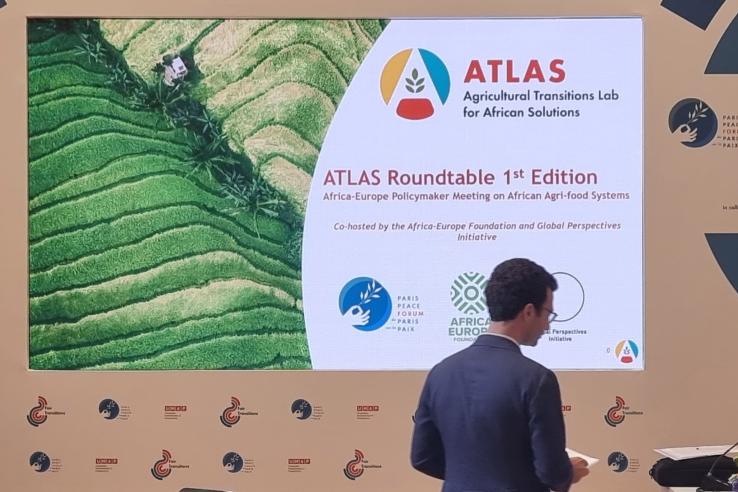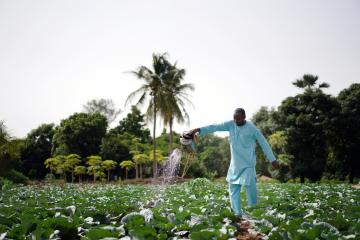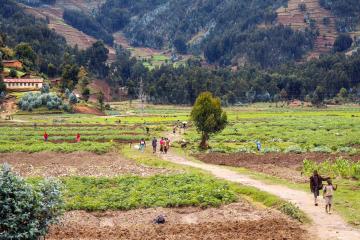
Mobilizing agricultural development in Africa: J-PAL joins the Paris Peace Forum Coalition

Africa's agricultural potential is substantial. While the continent holds more than half of the world's fertile and yet-unused land, agricultural productivity lags behind other regions of the world. Unlocking this potential could increase food security across Africa, where 60 percent of the population has unstable access to food.
Policy change is an important component to enable this reality. The Paris Peace Forum (PPF), a French nonprofit organization, launched a policy initiative in 2023 called "Mobilizing for Strong and Sustainable Food and Nutrition Systems in Africa" to promote sustainable agricultural transformation on the African continent through South-North dialogue on policy and practice. J-PAL’s Agriculture sector has joined the coalition of international organizations committed to this initiative, with the goal of supporting evidence-informed decision-making among partner organizations and countries.
Mobilizing a coalition for Africa's agricultural development
Improving the agricultural productivity of small-scale farmers, who dominate Africa’s agriculture sector, is a critical policy objective in order to improve global food security. However, this is a complex task given low agricultural technology adoption rates across the continent coupled with evolving factors like changes in international market structures, trade disruptions under Covid-19 protocols, geo-political conflict, and the increasing impacts of climate change on farmers’ yields and welfare.
The PPF's initiative seeks to unlock Africa's potential as a major agricultural power by 2050 through North-South collaboration and learning. Comprised of international organizations and research institutions, such as the International Fund for Agricultural Development (IFAD), the Consultative Group on International Agricultural Research (CGIAR), the Mo Ibrahim Foundation, Special Envoy for Food Systems at the African Union, and the Mohammed VI Polytechnic University (UM6P) as well as companies and philanthropic organizations, the coalition seeks to build consensus and address the following topics:
- Improve soil health, for instance, by implementing comprehensive soil mapping and providing customized fertilizers to enhance soil fertility and crop yields
- Reduce postharvest losses by enhancing storage and transportation infrastructure to ensure more produce reaches the market
- Support sustainable intensification practices, such as precision agriculture, to help maintain high yields without expanding into new lands, preserving ecosystems, among others.
This year, the PPF held its Spring Meeting titled “Fair Transitions” on June 10, 2024, at UM6P in Benguerir, Morocco, convening heads of state to discuss the need for stakeholder cohesion and attracting financial investment. The coalition launched the Agricultural Transitions Lab for African Solutions (ATLAS), a platform for policy dialogue and collaboration between the Global North and South to identify impactful innovations for African agri-food systems and increase investments in African food systems.
Evidence-informed policy decisions and practice
J-PAL will play a critical role disseminating evidence from randomized evaluations in agriculture to inform policy conversations among members of the coalition. Bringing evidence into policy conversations is a powerful tool to enhance the efficiency and effectiveness of policies addressing global challenges.
As climate change continues to affect how farmers and governments make decisions about how to integrate markets to increase food security, among many other decisions, evidence can inform how they frame questions and problems, and understand possible solutions to address the changing policy, economic, and physical environment.
J-PAL’s network of researchers and Scholars have generated research across a number of important and relevant topics to the coalition’s agenda. To support ATLAS’s goals, J-PAL will leverage fifteen years of research generated through the Agricultural Technology Adoption Initiative and the Digital Agricultural Innovations and Services Initiative to disseminate relevant policy lessons on farmers’ constraints to adopting improved technologies. J-PAL will also leverage findings from new research funded through the UM6P-J-PAL Agricultural Lab for Africa, a lab with OCP Africa that will generate actionable evidence on enhancing small-scale farmers’ productivity, profitability, and food security in Africa.
Drawing from this evidence base and through the development of our Policy Insights, J-PAL has synthesized emerging lessons across multiple evaluations and contexts, highlighting the mechanisms that help policymakers make sense of research results.
Driving change through partnership
By bringing together governments, donors, implementing partners, think tanks, and research centers, this coalition creates space for building new links across the agricultural development ecosystem, forging new opportunities for evidence-informed decision-making and collaboration across countries, sectors, and regions. As a member of this coalition, J-PAL will harness rigorous research from the network to inform actionable policies in support of the coalition's mission to drive change through partnership and achieve sustainable agricultural development.
Related Content

Celebrating the DAISI Regional Scholars Program—Two-years strong

Using insurance and climate-smart technologies to help farmers cope with weather-based risk


